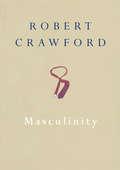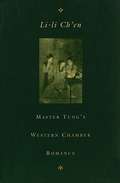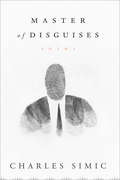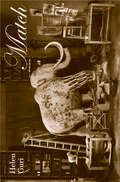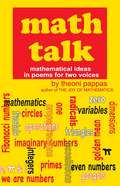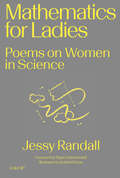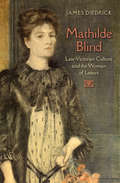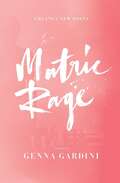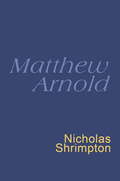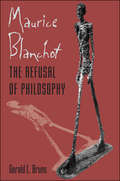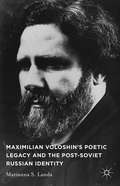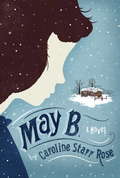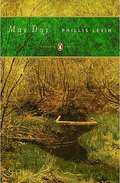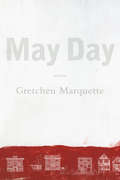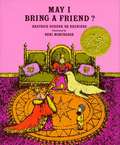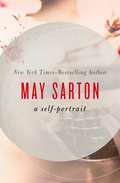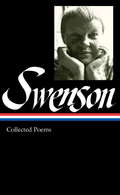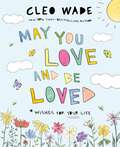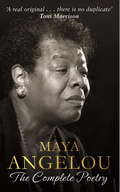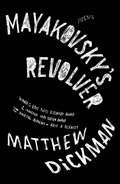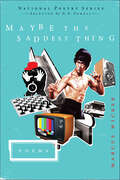- Table View
- List View
Masculinity
by Robert CrawfordIn MASCULINITY, Robert Crawford elegantly explores many aspects of that troubling concept, from imperial militarism to his own experiences as father, husband, and son. By turn affectionate and amusing, painful and self-excoriating, Crawford wryly examines, sometimes in intimate detail, what it is to be male - from awkward, unsporty and even more awkward adolescent, to husband, father of a child and, apparently, New Man. Clever, accessible, very funny and chillingly accurate, MASCULINITY is a sparklingly original collection. Star Trek Epigrams Mr Sulu, set the controls To Economy Wash. We're about to venture Where no man has gone before. Kirk to enterprise: 'I'm going back to my cabin With a box of Kleenex. I want to experience the lonliness of Command. '
Master Tung's Western Chamber Romance
by Tung Chieh-Yuan Li-Li Ch'EnComprising of 184 prose passages and 5,263 lines of verse to be narrated and sung by a performing singer-storyteller, it is an elaboration of the T'ang dynasty love story, The Story of Ying-ying, by Yuan Chen (779-831).
Master of Disguises: Poems
by Charles Simic&“This 20th collection from the former U.S. poet laureate departs only by degrees from his poems of earlier decades—but it could just be his best book.&” —Publishers Weekly (starred review) In his first volume of poetry since his tenure as poet laureate, Charles Simic shows he is at the height of his poetic powers. These new poems mine the rich strain of inscrutability in ordinary life, until it is hard to know what is innocent and what ominous. There is something about his work that continues to be crystal clear and yet deeply weighted with violence and mystery. Reading it is like going undercover. The face of a girl carrying a white dress from the cleaners with her eyes half-closed. The Adam & Evie Tanning Salon at night. A sparrow on crutches. A rubber duck in a shooting gallery on a Sunday morning. And someone in a tree swing, too old to be swinging and to be wearing no clothes at all, blowing a toy trumpet at the sky.&“Simic&’s compact poems carry concealed weapons amid unnerving juxtapositions . . . Simic&’s edgy, brooding poems are like saxophone solos played under a bridge in the deep, dark hours of the spinning world&’s bruising insomnia.&” —Booklist&“In retrospect, the man who&’s referred to himself as a &‘cheerful pessimist&’ succeeds again in demonstrating his ability to condense meaning without obscuring it, to empower his poems with paradox, and to mesh seamlessly the real and imagined. And though many of the poems in Master of Disguises continue a style trend, they are also verbal tightropes off which a reader rarely falls, tightropes that demand—and deserve—a reader&’s complete attention.&” —Rattle
Match
by Helen GuriRobert Brand has given up on real women. Relationships just haven't ever worked out well for him. He has, however, found a (somewhat problematic) solution, a new feminine ideal: the 110-pound sex doll he ordered over the internet. Showing an uncanny access to the voice of the rejected, unimpressive, emotionally challenged modern male, Helen Guri's debut collection explores Robert's transition from lost and lonely to loved, if only by the increasingly acrobatic voices in his mind. Match's touching, whip-smart poems chart the limits of the mind/body relationship in decidedly virtual times. Does our hero's lovesick, wry, self-searching and often self-annihilating gaze signal some catastrophic aversion to depth or a feverish (if unsettling) reassertion of the romantic impulse? Can anything good really happen when the object of one's affection is, literally, an object? And if she looks like a human being, can you ever know for sure she isn't one? Equal parts love story, social parody and radiant display of lyrical gymnastics, Match announces the arrival of a daring, forthright and stubbornly original new talent.
Materia Poetica: Homeopathy in Verse
by Sylvia Seroussi ChatrouxHomeopathy in verse; Poems revealing the characteristics seen for the specific homeopathic remedy. Quite helpful as a review of remedies though the book is not meant for medical purposes.
Math Talk
by Theoni PappasWho would have ever thought there was a direct way to connect mathematical concepts to poetry? Creative juices were certainly at work when this book of mathematical dialogues was created by Theoni Pappas. It presents anew way to enjoy and learn mathematical ideas via poetic dialogues read by two people. A new twist to mathematical themes.-24 delightful and informative poetic dialogues for exploring math ideas.- - TOPIC POEMS INCLUDE-· Mathematics · Circles · Proper fractions · Fractals· Fibonacci numbers · One · Operations · Imaginary numbers· Möbius strip · Zero · Squares · Operations· Variables · Radicals · Triangles · · Primes · Dimensions· Golden Mean · e, & i (for three voices)· Integers · Tessellations · Even numbers· Googols · We are numbers.
Mathematics for Ladies: Poems on Women in Science (Goldsmiths Press / Gold SF)
by Jessy RandallPoems about historical women in STEM fields.Hilarious, heart-breaking, and perfectly pitched, these carefully researched poems about historical women in science, technology, engineering, mathematics, and medicine will bring you to both laughter and outrage in just a few lines. A wickedly funny, feminist take on the lives and work of women who resisted their parents, their governments, the rules and conventions of their times, and sometimes situations as insidious as a lack of a women&’s bathroom in a college science building. Discover seashells by the seashore alongside Mary Anning and learn how Elizabeth Blackwell lost her eye. Read about Bertha Pallan&’s side hustle in the circus, Honor Fell bringing a ferret to her sister&’s wedding, Annie Jump Cannon cataloguing stars, Mary G. Ross stumping the panel on &“What&’s My Line?,&” Alice Ball&’s cure for leprosy, and Roberta Eike stowing away on a research vessel. Some of these poems celebrate women who triumphed spectacularly. Others remember women who barely survived. Explore the stories of women you may have heard of (Marie Curie, Jane Goodall, Émilie du Châtelet) alongside those of others you may not (Virginia Apgar, Maryam Mirzakhani, Ynes Mexia, Susan La Flesche Picotte, Chien-Shiung Wu). If you have come across Randall&’s poems in Scientific American, Analog, or Asimov&’s, you will have already opened the door to these tales, all the more extraordinary because they are true.Illustrated with Kristin DiVona&’s portraits for NASA&’s &“Reaching Across the Stars&” project, this is a book to share with scientists, feminists, and poets, young and old and of any gender.
Mathilde Blind: Late-Victorian Culture and the Woman of Letters (Victorian Literature and Culture Series)
by Herbert F. Tucker Andrew Stauffer James DiedrickWith Mathilde Blind: Late-Victorian Culture and the Woman of Letters, James Diedrick offers a groundbreaking critical biography of the German-born British poet Mathilde Blind (1841-1896), a freethinking radical feminist. Born to politically radical parents, Blind had, by the time she was thirty, become a pioneering female aesthete in a mostly male community of writers, painters, and critics, including Algernon Charles Swinburne, William Morris, Ford Madox Brown, William Michael Rossetti, and Richard Garnett. By the 1880s she had become widely recognized for a body of writing that engaged contemporary issues such as the Woman Question, the forced eviction of Scottish tenant farmers in the Highland Clearances, and Darwin's evolutionary theory. She subsequently emerged as a prominent voice and leader among New Woman writers at the end of the century, including Mona Caird, Rosamund Marriott Watson, and Katharine Tynan. She also developed important associations with leading male decadent writers of the fin de siècle, most notably, Oscar Wilde and Arthur Symons. Despite her extensive contributions to Victorian debates on aesthetics, religion, nationhood, imperialism, gender, and sexuality, however, Blind has yet to receive the prominence she deserves in studies of the period. As the first full-length biography of this trailblazing woman of letters, Mathilde Blind underscores the importance of her poetry and her critical writings (her work on Shelley, biographies of George Eliot and Madame Roland, and her translations of Strauss and Bashkirtseff) for the literature and culture of the fin de siècle.
Matric Rage
by Genna GardiniThe eagerly-awaited debut from one of the country’s most exciting young poets, Matric Rage is Genna Gardini’s reckoning with youth, womanhood and mortality. With hyper-literate, humorous and often heartbreaking poems, Gardini signals a wind change in South African poetry – where the personal is not just political, but polemical, too. In sickness and sex, misogyny and manners, this is a collection that, above all, showcases a powerful writer coming unapologetically into her own.
Matric Rage
by Genna GardiniThe eagerly-awaited debut from one of the country’s most exciting young poets, Matric Rage is Genna Gardini’s reckoning with youth, womanhood and mortality. With hyper-literate, humorous and often heartbreaking poems, Gardini signals a wind change in South African poetry – where the personal is not just political, but polemical, too. In sickness and sex, misogyny and manners, this is a collection that, above all, showcases a powerful writer coming unapologetically into her own.
Matthew Arnold
by Matthew ArnoldCritic, essayist, educator and poet, author of The Scholar Gypsy, Dover Beach, The Forsaken Merman and other popular poems.
Matthew Arnold: Dramatic And Later Poems (1885) (Collected Works Of Matthew Arnold)
by Matthew Arnold Nicholas ShrimptonCritic, essayist, educator and poet, author of The Scholar Gypsy, Dover Beach, The Forsaken Merman and other popular poems.
Maurice Blanchot: The Refusal of Philosophy
by Gerald L. BrunsA series of close readings addresses the philosophical and political questions that have surrounded Blanchot and his writings for decadesSelected by Choice Magazine as an Outstanding Academic TitleAs a novelist, essayist, critic, and theorist, Maurice Blanchot has earned tributes from authors as diverse as Jacques Derrida, Giles Deleuze, and Emmanuel Levinas. But their praise has told us little about what Blanchot's work actually says and why it has been so influential. In the first comprehensive study of this important French writer to appear in English, Gerald Bruns ties Blanchot's writings to each other and to the works of his contemporaries, including the poet Paul Celan.Blanchot belongs to the generation of French intellectuals who came of age during the 1930s, survived the Occupation, and flourished during the quarter century or so after World War II. He was one of the first French intellectuals to take a systematic interest in questions of language and meaning. His focus in the mid-1930s on extreme situations—death, madness, imprisonment, exile, revolution, catastrophe—anticipated the later interest of the existentialists. Like Nietzsche, Wittgenstein, and Adorno, Blanchot was a self-conscious writer of fragments, and he has given us one the most developed investigations that we have on the fragment as a kind of writing.In a series of close readings, Bruns addresses the philosophical and political questions that have surrounded Blanchot and his writings for decades. He describes what is creative in Blanchot's readings of Heidegger's controversial works and examines Blanchot's conception of poetry as an inquiry into the limits of philosophy, rationality, and power.
Maximilian Voloshin’s Poetic Legacy and the Post-Soviet Russian Identity
by Marianna S. LandaFamed and outspoken Russian poet, Maximilian Voloshin's notoriety has grown steadily since his slow release from Soviet censorship. For the first time, Landa showcases his vast poetic contributions, proving his words to be an overlooked solution both to the political and cultural turmoil engulfing the Soviet Union in the early twentieth century.
May B.
by Caroline Starr Rose<P>I've known it since last night: <br>It's been too long to expect them to return. Something's happened. <P>May is helping out on a neighbor's Kansas prairie homestead--just until Christmas, says Pa. She wants to contribute, but it's hard to be separated from her family by 15 long, unfamiliar miles. Then the unthinkable happens: May is abandoned. Trapped in a tiny snow-covered sod house, isolated from family and neighbors, May must prepare for the oncoming winter. While fighting to survive, May's memories of her struggles with reading at school come back to haunt her. But she's determined to find her way home again. <P>Caroline Starr Rose's fast-paced novel, written in beautiful and riveting verse, gives readers a strong new heroine to love.
May Day
by Phillis LevinA sensuous and musical new collection from acclaimed poet Phillis Levin May Day is a work of a visionary imagination. In tones playful and celebratory, in gestures both intimate and international, Levin's poems explore how tenderness and violence change our lives. From a flood overtaking the Prague zoo to the joy of a maypole dance, from a mural of the Trojan War in a Greek diner in New York to the "noiseless explosions" of time in the opening of a flower, these poems are rhapsodies of the senses and the intellect, disclosing new thresholds of meaning.
May Day: Poems
by Gretchen MarquetteYou arrive at my altar with no ideawhat it means to worship--to adore. You haven't even learned it:ecstasy and suffering make the same face.--from "The Offering"May Day is both a distress call and a celebration of the arrival of spring. In this rich and unusually assured first collection, the poet Gretchen Marquette writes of the losses of a brother gone off to war in Afghanistan and Iraq, and a great love--losses that have left the world charged with absence and grief. But there is also the wonder of the natural world: the deer at the edge of the forest, the dog reliably coaxing the poet beyond herself and into the city park where by tradition every May Day is pageantry, a festival of surviving the long winter. "What does it mean to be in love?" one poem asks. "As it turns out, / the second best thing that can happen to you / is a broken heart."May Day introduces readers to a new poet of depth and power.
May I Bring a Friend
by Beatrice Schenk de Regniers Beni Montresor<p>An imaginative boy brings a surprising array of friends to dine at the palace in this Caldecott Medal–winning picture book. <p>One day, a small boy receives a very special invitation—the King and the Queen have invited him to the castle for tea. He accepts, with one question: “May I bring a friend?” <p>“Any friend of our friend is welcome here,” says the King. But their guest’s friend turns out to be someone they never expected! <p>Beatrice Schenk de Regniers’s rhythmic text and the fantastical, jewellike artwork of Beni Montresor have made this book a favorite for more than twenty-five years.</p>
May Sarton: A Self-Portrait
by May SartonThis transcript from the film World of Light: A Portrait of May Sarton illuminates the life and writing of the poet while celebrating the joys of creativity, love, and solitude In June of 1979, May Sarton answered the questions of two filmmakers and read to them from her poetry. This four-day "jam session" ultimately became an acclaimed documentary about her life and work. For Sarton, the muse has always been female, and the writer says that her own poems "tell me where to go." In this rare and inspiring window into a singular woman's soul, Sarton speaks candidly about everything from how a single image opened the door to writing about her mother to the importance of transparency in art and life. She shares insights into her very personal art, including the unusual people and events that provide inspiration, how creativity can grow out of pain, solitude as a two-edged sword, the difficulties of being a female poet, and the ways love can open "the door into one's own secret and . . . frightening real self." Featuring sections entitled "On Inner Space," "On Nature," and "On Love," this revealing volume is also about the need go on, even when up against overwhelming odds. May Sarton: A Self-Portrait pays tribute to an artist's vision and serves as a revealing window into a fascinating life.
May Swenson: Collected Poems
by Langdon Hammer May SwensonIn celebration of the centenary of May Swenson's birth, The Library of America presents a one-volume edition of all of the poems that Swenson published in her lifetime--from her first collection Another Animal (1954) to the innovative shaped poems of Iconographs (1970) to her final work In Other Words (1987)--as well as a selection of previously uncollected work. The collection reveals the sweeping compass of Swenson's curiosity: nature poems display her keen observation of wildlife; exuberant and erotic love poems celebrate beauty and passion; place poems record her travels to the American Southwest, France, and Italy and her residence in New York City and Sea Cliff, Long Island; verse "analyses" investigate baseball, wave motion, the DNA molecule, bronco busting, James Bond movies, and the first walk on the moon. Swenson was an inveterate reviser: poems in earlier volumes were frequently reworked for inclusion in later volumes, such as To Mix with Time (1963) and New and Selected Things Taking Place (1978). While preserving the order of publication, this volume presents the author's final or definitive version. Substantive textual variants and title changes are detailed in the notes to the volume.
May You Love and Be Loved: Wishes for Your Life
by Cleo WadeAn Amazon Best Book of the Month!May You Love and Be Loved: Wishes For Your Life is the tender and joyous next picture book from New York Times-bestselling author and poet, Cleo Wade. May you know fear but not be driven by itMay you know joy and follow it everywhereMay you know light and shine it every chance you getFrom the bestselling author of What the Road Said, Cleo Wade’s next heartfelt and lyrical picture book is a love letter to the infinite potential of the future, expressing the many hopes and dreams we hold for our children and ourselves. Gorgeously illustrated by the author and filled to the brim with her signature big-hearted emotions, this book is an important reminder that, above all, what we wish for everyone’s precious life is that they can love and be loved.
Maya Angelou: Complete Poetry
by Dr Maya AngelouFrom her reflections on African American life and hardship in Just Give Me a Cool Drink of Water 'fore I Diiie to her revolutionary celebrations of womanhood in Phenomenal Woman and Still I Rise, and her elegant tributes to dignitaries Bill Clinton and Nelson Mandela (On the Pulse of Morning and His Day Is Done, respectively), every inspiring word of Maya Angelou's poetry is included in the pages of this volume.
Mayakovsky's Revolver: Poems
by Matthew DickmanFrom a dazzling, award-winning young poet, a collection that paints life as a celebration in the dark. At the center of Mayakovsky's Revolver is the suicide of Matthew Dickman's older brother. "Known for poems of universality of feeling, expressive lyricism of reflection, and heartrending allure" (Major Jackson), Dickman is a powerful poet whose new collection explores how to persevere in the wake of grief. from "Mayakovsky's Revolver" I keep thinking about the way blackberries will make the mouth of an eight year old look like he's a ghost that's been shot in the face. In the dark I can see my older brother walking through the tall brush of his brain. I can see him standing in the lobby of the hotel, alone, crying along with the ice machine.
Maybe the Saddest Thing: Poems (National Poetry)
by Marcus WickerWinner of the 2011 National Poetry Series Prize as selected by D.A. Powell, Marcus Wicker's Maybe the Saddest Thing is a sterling collection of contemporary American poems by an exciting new and emerging voice.
